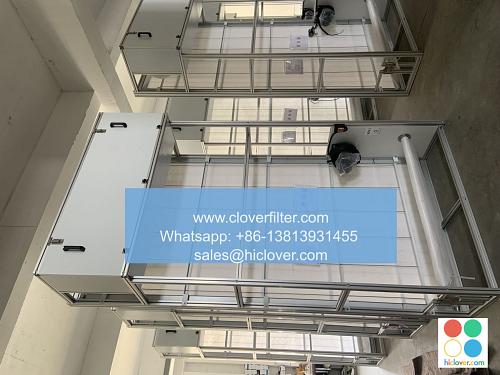Introduction to Automatic Roll Air Filters in Bio-Labs

Bio-labs, or biological laboratories, are sensitive environments that require strict control over airborne contaminants to prevent contamination and ensure the safety of personnel and samples. One crucial component in maintaining a clean and safe environment in bio-labs is the use of High Efficiency Particulate Air (HEPA) filters, specifically Automatic Roll Air Filters. In this article, we will delve into the world of automatic roll air filters, exploring their design and functionality, application areas, and the benefits they offer in bio-lab settings.
What are Automatic Roll Air Filters?
Automatic roll air filters are a type of air purification system designed to capture airborne particles, including dust, bacteria, and other microorganisms, from the air in bio-labs. These filters are equipped with a roll-out mechanism, allowing for the continuous replacement of filter media without the need for manual intervention. This automated process ensures that the air in the bio-lab remains clean and free from contaminants, reducing the risk of cross컨amination and maintaining a sterile environment.
Design and Functionality
Automatic roll air filters are designed with a compact and modular structure, making them easy to integrate into existing bio-lab ventilation systems. The filters are typically equipped with a pre-filter to capture larger particles, followed by a HEPA filter to capture smaller particles, including bacteria and viruses. The roll-out mechanism is controlled by a sensors and automation system, which monitors the filter’s condition and replaces the filter media as needed. This self-sustaining system minimizes the need for manual maintenance, reducing downtime and operational costs.
Application Areas
Automatic roll air filters have a wide range of applications in bio-labs, including:
- Cell culture laboratories: where the risk of contamination can have devastating consequences on cell growth and experiment outcomes.
- Microbiology laboratories: where the handling of microorganisms requires strict control over airborne contaminants to prevent the spread of infection.
- Virology laboratories: where the study of viruses demands a highly controlled environment to prevent the spread of disease.
- Genetics and genomics laboratories: where the analysis of DNA and RNA requires a clean and stable environment to prevent contamination and ensure accurate results.
Benefits of Automatic Roll Air Filters in Bio-Labs
The integration of automatic roll air filters in bio-labs offers numerous benefits, including:
- Improved air quality: by capturing airborne particles and microorganisms, reducing the risk of contamination and infection.
- Increased productivity: by minimizing downtime and reducing the need for manual maintenance.
- Enhanced safety: by providing a sterile environment for personnel and samples, reducing the risk of exposure to hazardous materials.
- Cost savings: by reducing operational costs and minimizing the need for filter replacements.
Conclusion
In conclusion, automatic roll air filters are a crucial component in maintaining a clean and safe environment in bio-labs. Their design and functionality, combined with their wide range of applications, make them an essential tool in the pursuit of scientific research and discovery. By integrating automatic roll air filters into bio-lab ventilation systems, researchers can ensure a sterile environment, reduce the risk of contamination, and focus on advancing our understanding of the biological sciences. As the biotechnology and pharmaceutical industries continue to evolve, the importance of automatic roll air filters in bio-labs will only continue to grow, driving innovation and progress in these fields.

